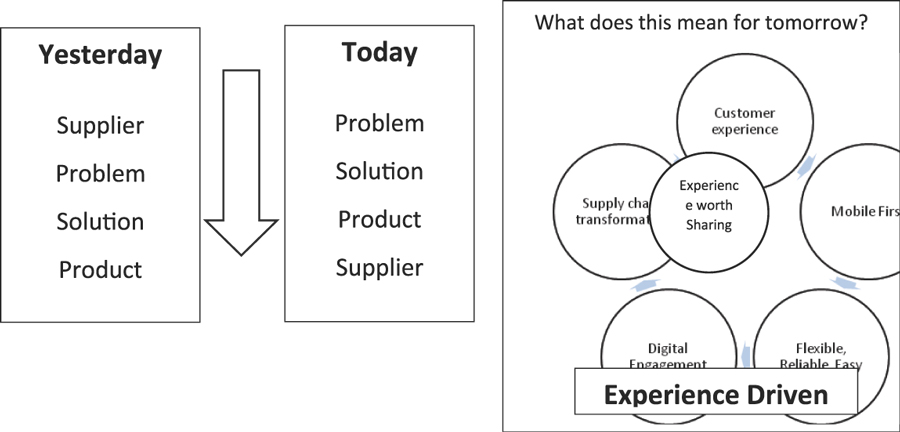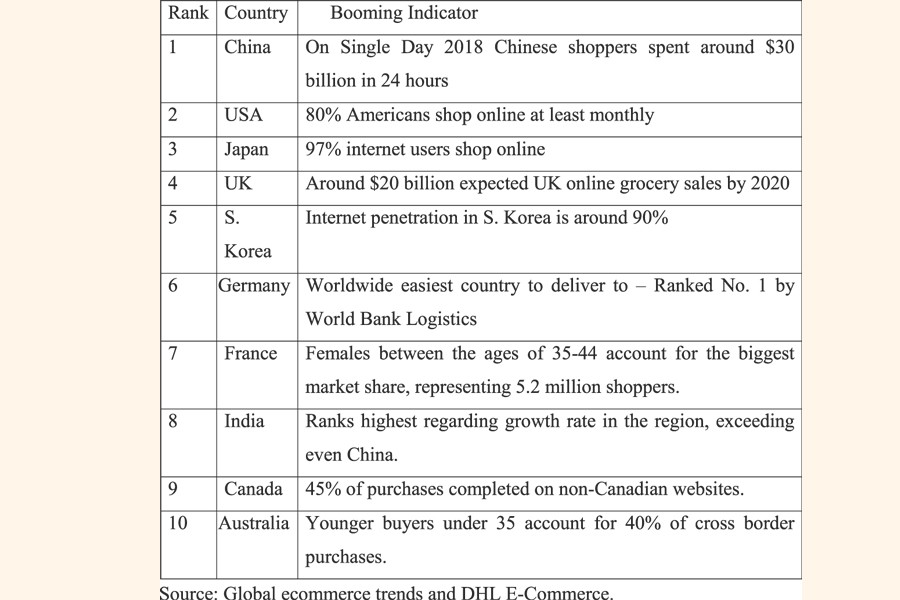It all started 5,000 years ago when traders actively traded in spices across different continents along with other luxury items for better prices. That spice trade later shaped the international trade in modern times. Nowadays, e-commerce has drastically changed the way we traded: every day, millions of purchases are made online, and thousands of shipments are being delivered to end users. However, even this trend is also currently undergoing a further shift-consumers are increasingly becoming more comfortable with the idea of buying from retailers and manufacturers abroad. In fact, every seventh online purchase is already conducted as a cross-border transaction. You may name it as the 21st century spice trade exactly the same way DHL Express mentioned it on their e-commerce research journal.
On November 11 2018, Alibaba, the e-commerce giant, reached a milestone by breaking its previous single-day record by fetching a record 213.5 billion yuan (US$30.7 billion) in sales during its 24-hour online retail sales event titled Single Day. The Single Day, also called "Double 11", is the world's biggest online sales event, outperforming the sales of US shopping holidays Black Friday and Cyber Monday combined. This year the company surpassed last year's full-day sales record of 168 billion yuan in just under sixteen hours. Absolutely phenomenal, isn't it? The company said it worked with 180,000 brands across over 200 countries, and shortly before midnight on Sunday it had sent over a billion packages. Daniel Zhang, Chief executive, said "Today we reached 200 billion (yuan). But we have to change. We have to continue to change to reach 300 billion or 500 billion," So transformation is happening and it is real. The question is how to accommodate this opportunity into future growth. If we look close into top 10 most potential e-commerce markets we would be more certain why companies related to e-commerce are going crazy.
Adapt or Disappear: Key to Sustainability
Today in the fast paced competitive world, adaptability with change is considered as a great strength. It is more visible in the supply chain, logistics and e-commerce industry.
One of the most-talked-about topics in the express industry, as well as among Wall Street analysts, is whether Amazon is preparing themselves to bypass the service giant FedEx and UPS to ensure their expected level of customer satisfaction with higher profit margin. Since 2014, the e-commerce giant has been spending heavily on airplanes, truck trailers, self-service lockers and fulfilment, sorting and distribution centres in every major metropolitan area in the US. These massive investments over the time have led the people to believe that the e-commerce giant is on its way to build its own delivery network bypassing FedEx and UPS. It's not only due to delivering packages to customers, rather a kind of customer experience which creates more loyal customers. We may call it the physical touch point of an online shopping experience. Like Prime Video, Alexa and Amazon Music ?it would serve further which will drive sales on its platform and add value to the customer life cycle.
Deutsche Post DHL (DPDHL), another international courier service giant, recently announced their strategic move to declare a separate entity named DHL E-Commerce Solutions, formerly part of (PeP) as of January 1, 2019. It shows their clear intention to consider digital business seriously.
Right First Time is Vital
By 2020 global e-commerce sales are expected to rise to $4.1 trillion among which $900 billion will be coming from cross-border sales. Currently 16 billion devices are connected online. About 2.1 billion people will buy from online by 2020 and 15% of the total retail sales are generated online. Millennials are in the driving seat. They want to choose from varieties, looking for inclusive prices and hassle-free shopping and shipping. That is why couriers are investing to reach the last mile delivery, reduce transit time. Their emphasis is on both domestic and cross-border delivery. They are establishing regional fulfilment centres and providing return options to gain maximum cart value. People want today personalised customer service, want full visibility with a broad range of delivery options, for example, On Demand Delivery (ODD) by DHL, My Choice by UPS and Delivery Manager by FedEx. In the upcoming days, who owns the software infrastructure owns the market. Amazon is on its way to have it, and become the world's most dominant logistics company of the future. What Amazon has done so far is more valuable than the sum of these commoditised physical assets: Amazon owns the world's most vigorous logistics & supply chain software infrastructure that enables every ship, airplane, warehouse and vehicle in its network to work together like an engine, which is gradually going better and better.
Technological Disruption & Future
 Something interesting is happening in the world of technology. Physical asset and manufacturing base no more can be able to influence the market. Virtual market place and platforms instead are having the decision-making power. Robotics & Artificial Intelligence outnumber human efficiency. A predictive supply chain with full resilience is already there in the customer expectation. Trade wars, political instability, strict customs regulation, aviation safety, climate change, regional alliance, environment and industrial compliance, cargo and shipping safety, etc. are everyday issues the business organisations are dealing with. Logistics companies now are proactively providing supply chain incident news in advance to enable cross-border trade safer, for example, the DHL RESILIENCE360solution. It is a unique supply chain risk management solution built on four sophisticated products: Supply Chain Visualisation, Risk Assessment, a near real-time Incident Monitoring solution, and Risk Response with dedicated control towers that can actively respond to incidents and manage business continuity. As the day progresses, the full control on supply chain and developing own network system will ensure long term sustainability. Data and analytics are already in its place. Multiple applications are now replacing manual dependency, making it faster, automated and fool-proof. Tracking, tracing, resolution, proactive quality control, reduced transit time, customs clearance and return options can't satisfy customers anymore, because these are now mandatory. Controlling should be mobile and entire supply chain will be in the pocket, a matter of a fingerprint. We have seen disruption to entertainment, media, telecommunication, retail and automobile industry. The supply chain and logistics are on the verge of digital disruption. Having right investment at first time has no alternatives. First movers into the untapped market will ensure continuous growth. Be agile. If we look at companies like Microsoft, Intel and even Apple, they are recently trying different things, want to diversify services and product line by coping with changes. Most importantly, a single cash cow would no more be a sustainable venture.
Something interesting is happening in the world of technology. Physical asset and manufacturing base no more can be able to influence the market. Virtual market place and platforms instead are having the decision-making power. Robotics & Artificial Intelligence outnumber human efficiency. A predictive supply chain with full resilience is already there in the customer expectation. Trade wars, political instability, strict customs regulation, aviation safety, climate change, regional alliance, environment and industrial compliance, cargo and shipping safety, etc. are everyday issues the business organisations are dealing with. Logistics companies now are proactively providing supply chain incident news in advance to enable cross-border trade safer, for example, the DHL RESILIENCE360solution. It is a unique supply chain risk management solution built on four sophisticated products: Supply Chain Visualisation, Risk Assessment, a near real-time Incident Monitoring solution, and Risk Response with dedicated control towers that can actively respond to incidents and manage business continuity. As the day progresses, the full control on supply chain and developing own network system will ensure long term sustainability. Data and analytics are already in its place. Multiple applications are now replacing manual dependency, making it faster, automated and fool-proof. Tracking, tracing, resolution, proactive quality control, reduced transit time, customs clearance and return options can't satisfy customers anymore, because these are now mandatory. Controlling should be mobile and entire supply chain will be in the pocket, a matter of a fingerprint. We have seen disruption to entertainment, media, telecommunication, retail and automobile industry. The supply chain and logistics are on the verge of digital disruption. Having right investment at first time has no alternatives. First movers into the untapped market will ensure continuous growth. Be agile. If we look at companies like Microsoft, Intel and even Apple, they are recently trying different things, want to diversify services and product line by coping with changes. Most importantly, a single cash cow would no more be a sustainable venture.
Customers are important
In the age of technology customers have power to influence others without any boundaries. Customers are no longer kings, who only have certain territories. Through social media a single customer can influence approximately 250 people in the both positive and negative ways. Future business success depends on customer experience, hence solution-driven marketers will gain acceptance. Content and experience worth sharing and accepted by others would be successful. In the age of social media people not only enjoy, they love to share their experience also. Reviews are important before making any buying decision. Facebook, Pinterest, YouTube channels are frontrunners nowadays in these areas.
 In the end, I am referring to a quote by former DHL Express CEO, Ken Allen, "People Drive Profit". A final touch point is crucial. So train and invest on people who will run the show. A robot can identify smile or anger through expression but an employee can find out beyond. And that psychological connectedness is the key. We still believe that people think logical but buy emotionally. Millennial customers are connected, independent, informed and emotionally attached with their brands. Don't forget they love to get preference. And no one better than your motivated employee can ensure that love and empathy to your customers.
In the end, I am referring to a quote by former DHL Express CEO, Ken Allen, "People Drive Profit". A final touch point is crucial. So train and invest on people who will run the show. A robot can identify smile or anger through expression but an employee can find out beyond. And that psychological connectedness is the key. We still believe that people think logical but buy emotionally. Millennial customers are connected, independent, informed and emotionally attached with their brands. Don't forget they love to get preference. And no one better than your motivated employee can ensure that love and empathy to your customers.
Al Fattah Md. Azim is currently working in a multinational supply chain and logistics organisation


